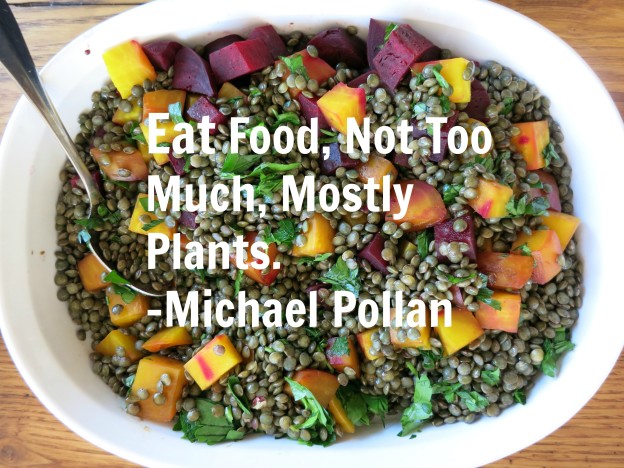Friday morning I made a pit stop at Trader Joes before heading to the Farmer’s Market to do some cooking and nutrition classes. At checkout, the cashier (hey, Pamela!) and I started chatting and she asked me what I was up to the rest of the day. I told her what I did and she got really excited! If you know me, you know how much I love enthusiasm, especially around food. So, she asks me a slew of questions: what’s the ultimate nutrition advice I can give, what should she eat, does everything have to be organic?
I love these questions. And, they’re surprisingly important given the all the nutrition advice online, on TV and from “experts” and MLM representatives claiming to have the next easy fix. There are tons of different diets out there, and none of them are the “perfect diet”. It’s easy to get caught up in debates about what’s better for you, smoothies or juice. Should I eat paleo or vegan? What about ketogenic? Are carbs bad? Unfortunately, when we’re given too much, and often contradictory, information and too many choices, we get stuck in overwhelm and inaction.
We are all different, our bodies are different, our energy requirements are different, our health and our concerns are different, our ethics and budgets are different. What does that mean? It means there is no one right answer for what each of us should eat. But, there is some basic nutrition advice that all of us can follow.
As Michael Pollen says, “Eat food, not too much, mostly plants.”
- Eat whole unprocessed foods.
- Cut sugary drinks out of your diet.
- Cook your own food.
- Eat lots of fruits and vegetables. More vegetables.
- Enjoy what you eat. Food should taste good.
- Learn to read nutrition labels. Avoid foods with more than a handful of ingredients or ingredients you can’t pronounce.
It’s not complicated nutrition advice, but it does take time, effort and planning to integrate. And, once you get there, then you can start looking at some of the other more nuanced questions. Maybe there’s a specific diet that would be better for you. If you have digestive problems, maybe a low FODMAP diet would work. If you have autoimmune issues, the AIP diet or Paleo diet might be right for you. But, taking on a restrictive diet without first mastering the above categories is a recipe for major overwhelm and stress. So, take it slow! Start by becoming more aware of what you’re eating. Start listening to your body for cues about how what you are eating is effecting you. Your body has so much wisdom to offer, but it starts with learning to decode your bodies specific language.
Good luck and have fun with it!
With love,
Samantha

